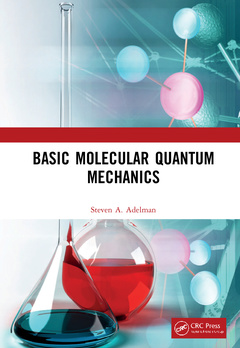Description
Basic Molecular Quantum Mechanics
Author: Adelman Steven A.
Language: English
Subjects for Basic Molecular Quantum Mechanics:
Keywords
Time Dependent Schrodinger Equation; Wave Function; Vibrational Spectroscopy; Quantum Mechanics; Rotational Spectroscopy; Complete Orthonormal Set; Electronic Structures; Common Eigenfunctions; Angular Momentum; Heisenberg Uncertainty Relation; Schroedinger Equation; System Wave Function; Initial Wave Function; Modern Quantum Mechanics; Classical Observable; Bohr Theory; Normalized Eigenfunction; Normalized Wave Functions; Quantum State; Potential Energy Function; State Wave Functions; Non-stationary State; Bohr Frequency Condition; Schrodinger Equation; Vice Versa; Time Independent; Momentum Observables; Standing Wave Solutions; Dulong Petit Law; De Broglie Wavelength
Publication date: 08-2021
· 17.8x25.4 cm · Hardback
Publication date: 08-2021
· 17.8x25.4 cm · Paperback
Description
/li>Contents
/li>Biography
/li>
Quantum mechanics is a general theory of the motions, structures, properties, and behaviors of particles of atomic and subatomic dimensions. While quantum mechanics was created in the first third of the twentieth century by a handful of theoretical physicists working on a limited number of problems, it has further developed and is now applied by a great number of people working on a vast range of problems in wide areas of science and technology.
Basic Molecular Quantum Mechanics introduces quantum mechanics by covering the fundamentals of quantum mechanics and some of its most important chemical applications: vibrational and rotational spectroscopy and electronic structure of atoms and molecules. Thoughtfully organized, the author builds up quantum mechanics systematically with each chapter preparing the student for the more advanced chapters and complex applications. Additional features include the following:
- This book presents rigorous and precise explanations of quantum mechanics and mathematical proofs.
- It contains qualitative discussions of key concepts with mathematics presented in the appendices.
- It provides problems and solutions at the end of each chapter to encourage understanding and application.
This book is carefully written to emphasize its applications to chemistry and is a valuable resource for advanced undergraduates and beginning graduate students specializing in chemistry, in related fields such as chemical engineering and materials science, and in some areas of biology.
Chapter 1 Toward Quantum Mechanics Chapter 2 Mathematics for Quantum Mechanics Chapter 3 The Schrodinger Equation and the Particle-in-a-Box Chapter 4 Wave Functions and Experimental Outcomes Chapter 5 Commutation Rules and Uncertainty Relations Chapter 6 Stationary and Non-stationary Quantum States Chapter 7 The Harmonic Oscillator Chapter 8 Rigid Rotations and Rotational Angular Momentum Chapter 9 Diatomic Rotational–Vibrational Spectroscopy Chapter 10 The Hydrogen-Like Atoms Chapter 11 Approximation Methods Chapter 12 Electrons in Atoms Chapter 13 Molecular Electronic Structure and Chemical Bonding
Steven A. Adelman was born and grew up in Chicago. He received a Ph.D. from Harvard University in Chemical Physics in 1972. He then became a post-doctoral fellow first at MIT and then at the University of Chicago. In 1975 he joined the Chemistry faculty of Purdue University as an Assistant Professor and was promoted to Full Professor in 1981. He is now Professor Emeritus of Chemistry at Purdue.
Adelman is a theoretical chemist whose research is centered in the field of statistical mechanics and he has contributed to several areas in that field. His most important contribution is to lay the physical, mathematical and computational foundations of the new field of chemical reaction dynamics in condensed matter, especially reaction dynamics on solid surfaces and in liquid solutions.
Adelman has been awarded both Alfred P. Sloan and John Simon Guggenheim Memorial fellowships. He is a fellow of both the American Physical Society and the American Association for the Advancement of Science. He has been listed in Marquis’ Who’s who in America every year since 1985 and has been listed four times in Marquis’ Who’s who in the world.




